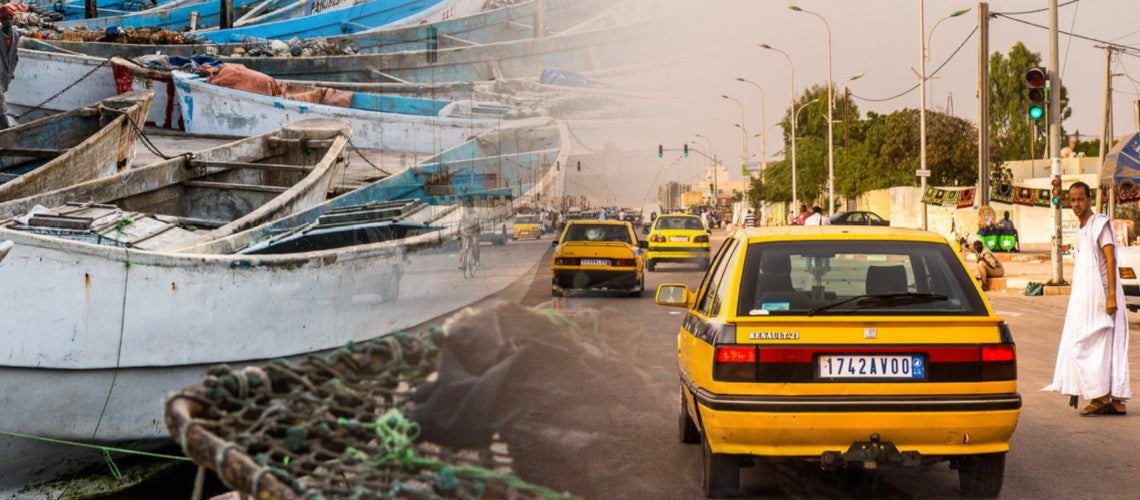 Mauritania - Country Economic Memorandum
Mauritania - Country Economic Memorandum
These past few months, the World Bank has published several analysis of trends and issues shaping Mauritania’s economic and development future, including the report on Macroeconomic Management of Gas Revenues in Mauritania and its third Economic Update with a special focus on education. Both make recommendations that could help the Mauritanian government accelerate its progress and mitigate the effects of the COVID-19 crisis. Our latest Country Economic Memorandum complements these series of analysis and highlights the importance of economic diversification and a well-managed urbanization to Mauritania’s economic development.
Mauritania is a sparsely populated and arid country that links the Arab Maghreb and western Sub-Saharan Africa (SSA). It is characterized by high reliance on natural resources as fishing and mining products accounted for 98.1% of total exports in 2017, and a very low population density of only 4.3 people per square kilometers, compared to an average of 44.9 in SSA.
Prior to the COVID-19 crisis, Mauritania’s long-term growth model suffered from structural constrains that prevented the country to move on its development agenda. Our Country Economic Memorandum finds that Mauritania did not leverage its natural resources sufficiently in the past, exposing the country to commodity price shocks and ultimately contributing to the economic deceleration post-2015. Meanwhile, rapid urban population growth without spatial densification of people and firms has deprived Mauritania of significant benefits and growth dividends from economies of scale and a shift towards more productive jobs into agro-industry, manufacturing and services.
While there is no blueprint for accelerating growth, a package of four policy areas could help Mauritania leverage the potential benefits of urbanization and foster economic diversification going forward.
1. Promoting a more market-oriented economy
To overcome the structural constraints that impair Mauritania from expanding its production base, it is imperative to develop a diversification strategy toward intensifying agriculture and livestock production, improving the quality of exported fish, exporting new products, and expanding its market reach by strengthening ties with West African countries. This should be accompanied by policies to remove legal barriers to women’s participation in the economy, facilitate access to finance, promote local entrepreneurship, and enhance competition in key markets which are dominated by few and well-connected companies.
2. Enhancing production factors
Mauritania lacks good educational outcomes, good infrastructure, and efficient use of land. Hence, it is very important to improve human capital through boosting the quality of teaching and strengthening the governance and management of the education sector. While Mauritania cannot change the vast geographical distances between its towns and cities, it can reduce the time it takes to overcome these distances by better connecting urban centers. Improving physical infrastructure, particularly in Nouakchott, should be accompanied by a well-studied transport plan that is connected to other cities’ transport plans. Finally, strengthening land management, by simplifying land registration procedures, aligning responsibilities to fewer institutional actors, and implementing and recording electronically existing registration instruments, is a pre-requisite to sound urban planning and securing land rights in rural areas is key to bolster agriculture productivity.
3. Improving urban planning
There is a need to improve urban planning by developing and implementing city master plans which play a key role as they lay out the city’s spatial structure and define land use and limit city expansion. But moving from a low density and sprawling city to one that is compact and connected requires more than effective urban planning. Incentive-based regulation including penalty taxation for vacant land are needed to encourage compactness and discourage speculation.
4. Better managing natural resources
Finally, an effective management of extractive revenues is critical for diversification. To do so, a sound fiscal framework should be designed based on a simple fiscal rule that has a clearly identified target and some degree of flexibility when unexpected economic shocks occur. The implementation of a rule-based fiscal framework will require strengthening fiscal institutions, which are key to guarantee that natural resource wealth is reinvested into productive assets.
As for most countries in the world, the ongoing COVID-19 pandemic is having significant economic effects in Mauritania that will under undermine past efforts for poverty reduction. Nevertheless, the process of economic rebuilding that must follow the crisis offers policy makers a unique opportunity to map out a more sustainable development model and steer the economy onto a path of accelerated and equitable economic growth for the rapidly growing population.



Join the Conversation